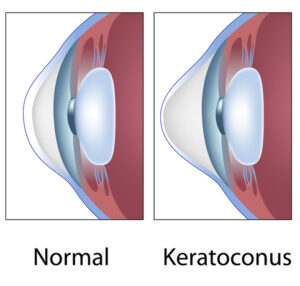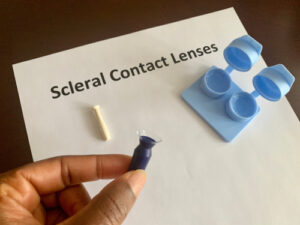Do you wear contact lenses? When it comes to wearing contacts, there are many kinds to choose from. As a result, it can be a little overwhelming to choose the best type for your eyes.
Most people can use soft and rigid contact lenses. If you have a more complicated prescription, corneal conditions, or dry eye, you may need specialty options. Keep reading to learn more about the specialty contact lenses that Williamson Eye Center offers our patients!
What Are Specialty Contact Lenses?
Before discussing the different kinds of specialty contact lenses, it’s essential to understand what specialty contact lenses are. These are contact lenses that are custom designed for your unique cornea.
This is often the best choice for patients that have conditions like or suffer:

- Keratoconus
- Severe dry eye syndrome
- Having corneal scars due to infection or trauma
- Severe astigmatism
- Progressive nearsightedness that’s only getting worse each year
- Finding it uncomfortable or almost impossible to wear current contact lenses
Standard contact lenses should provide vision correction as well as comfort. But for some patients, these contacts can’t get the job done.
If this is the case, specialty contact lenses specifically designed for your unique and one-of-a-kind eyes may be a better solution. You need to see your eye doctor to determine what kind of lenses are right for you.
Your eye doctor will also measure your eyes to make sure any contact lenses you choose will be the perfect fit for your eyes.
Rigid Gas-Permeable Lenses (RGP)

People with dry eyes might struggle to wear a standard soft contact lens compared to rigid gas-permeable contact lenses. Rigid gas-permeable contact lenses are impermeable.
Compared to a standard soft contact lens, soft contact lenses do not allow oxygen to reach the eye. Lack of oxygen prevents tears from lubricating the eye and can worsen dryness.
Some people with dry eyes or dry eye syndrome may experience more dryness when they wear soft contacts.
Rigid gas-permeable contacts are made out of silicone and customized to fit your cornea. As the material is silicone, it’s breathable but does not flex.
Because the rigid gas-permeable contact lens stays the same shape, this allows for more movement when you blink. This agitation increases the amount of oxygen that can enter the eye.
Rigid gas-permeable models can be smaller than traditional soft lenses. Covering less surface area improves how much oxygen reaches the entire eye.
Some people wear rigid gas-permeable lenses while sleeping. Extended wear may reshape the cornea if you have refractive errors or astigmatism.
This vision correction is called orthokeratology. You must have a special kind of rigid gas-permeable contact lens before you can sleep in your lenses.
If you have a complicated prescription or a diagnosed case of dry eye, your eye doctor may recommend trying rigid gas-permeable lenses. Expect an adjustment period.
Most people wear them for several hours per day for several weeks so they can get used to them. After this initial adjustment period, you should find it more comfortable to wear rigid gas-permeable contact lenses all day.
Scleral Contact Lenses
Williamson Eye Center is proud to have the state of Louisiana’s only certified expert and fellowship-trained scleral lens practitioner! This distinction allows us to provide our patients with scleral lenses even if they suffer from severe dry eyes and have struggled to wear contact lenses in the past.
The sclera is the outer layer of the eye. This white part encases the eye and stops at the cornea.

People who have irregular corneas may not have better vision when they wear standard contact lenses. These lenses will not create the perfect curved surface to reflect light into the eye.
Scleral lenses are slightly larger than regular contacts. They rest over the cornea and extend further onto the sclera.
The artificial lenses act as a corneal replacement. They improve sight for people with abnormal corneas by rounding the eye more naturally.
The large-diameter lenses create a space between the cornea and the lens. This area fills with fluid, which can improve dry eyes.
A standard contact lens will sit closer to the cornea and does not have this liquid cushion. People who have keratoconus may benefit from scleral lenses.
The condition occurs when the cornea bulges outward, creating a cone-shape. Scleral contacts fit over the cornea and reduce the angle of the rounding.
This simple change can significantly improve blurry vision and reduce light sensitivity.
Toric Contact Lenses
If you have astigmatism, you may be good candidates for toric lenses. Soft contacts are solid and spherical.
Toric lenses look more like a donut. They can have different refractive strengths throughout each lens.
This unique benefit helps those with corneas that are not evenly curved. People with astigmatism may need different lens strengths to support one eye.
Your eye doctor will measure the refraction in your vertical and horizontal planes. They will also determine the thickness and shape of your cornea. The manufacturer will create lenses that are the appropriate thickness to match your needs.
Your eye doctor will then send this information to have customized toric lenses created. Depending on your choice, toric lenses are available in dailies, which you throw away after a day, and other lenses will last up to a month or different disposable versions.
You can even buy colored toric contact lenses! Toric lenses are available in soft, hard, and rigid gas-permeable versions. Your eye doctor will discuss which is right for you.
Multifocal Contact Lenses
Are you nearsighted or farsighted but also have presbyopia? Multifocal contact lenses are for people with presbyopia that don’t want to wear bifocals.
Multifocal contact lenses feature several prescription strengths in each lens. You can look through the top of the lens to see while driving. Gaze through the bottom to read or make dinner.
When you look at bifocal glasses, you often see where the two prescription strengths meet. With multifocal contacts, the transition is gradual.
It’s easier on your eyes to switch from near to far distance. Plus, no one will be able to see the multiple prescriptions. This is quite preferable if you don’t want people knowing that you need to use something like reading glasses to help you see!
Wondering if specialty contact lenses may be better for you than wearing traditional contact lenses? Schedule an appointment at Williamson Eye Center today!



